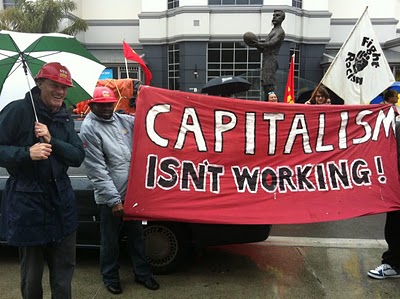There are some errors here – S’bu Zikode was not arrested after the attack on AbM although the office of Willies Mchunu did issue a statement threatening to arrest him.
http://www.stuff.co.nz/manawatu-standard/news/5593244/Mandelas-rainbow-nation-a-failure
Mandela’s rainbow nation ‘a failure’
LEE MATTHEWS
South African social justice campaigner S’Bu Zikode has one wish while he’s in New Zealand – to meet his own country’s deputy president Kgalema Motlanthe, and tell him that Nelson Mandela’s dream of a rainbow nation, based on respect and equality for all, has failed for millions of black people.
“I can’t get access to my own deputy president in my own country. It might be possible here, during the Rugby World Cup,” Mr Zikode said.
He was in Palmerston North yesterday, a stop on his speaking tour in New Zealand, with a fistful of foul statistics about life below the poverty line in South Africa.
The sub-text of his tour, organised by Global Peace and Justice Auckland, was that during the 1981 Springboks rugby tour, thousands of ordinary New Zealanders protested against South Africa’s apartheid political system, against the injustice and inequality suffered by millions of people, just because of their colour. He wants to acknowledge that action, and to tell New Zealanders that sadly, South Africa still needs international scrutiny.
“We held our first free elections in 1994. Nelson Mandela promised jobs, security, education, a rainbow nation where all people would get fair, even treatment, and respect.
“What’s happened is that the oppressed have become the oppressors. A huge gap has opened between the poor and the rich; it’s no longer a battle for justice based on colour, it’s now social class and money.”
South Africa’s population is 50 million people, 43 per cent of whom are unemployed. More than two million people squat in illegal squalid shanty towns, drawn to cities by the lure of jobs and education.
Impatient authorities do not want these shanty towns and refuse to supply them with services. They are regularly bulldozed. It is called displacement, to move the people on – but they have nowhere to go.
“Thousands of people packed on a tiny piece of land. The shelters are made of cardboard, of tin, or if you are lucky, mud. No services. No electricity, no water, no sewerage, no rubbish collection. What we have is crime and filth and diseases, tuberculosis and HIV-Aids.”
He lived in Kennedy Rd, one of Durban’s shack settlements, where 10,000 people squat, lighting their shelters with candles, cooking with explosive paraffin stoves. Fires are frequent, babies burn to death. There are five water-stand pipes – some “borrowed” connections from middle-class houses across the street. Six portable toilets. And 10,000 people.
“Durban has three million people. And 800,000 of us live like this, in shanty towns.”
The South African government has signed the United Nations’ plan that by 2020, one billion slum dwellers in the world will have proper housing.
But Mr Zikode says that while South Africa is building houses, the government is putting the new dwellings 50 or 70 kilometres away from existing cities and towns. There are no schools, no jobs and no transport, so nobody poor from a slum can afford to live there.
Mr Zikode, 35, the father of five children, was seven in 1981. He was living in Escourt, a tribal village, and his school had no books or chairs, but there were 60 children trying to learn from parents desperate to give them education. He won a scholarship to study law at university in Durban, but there was nowhere to live, no money to pay his fees, no money for food.
He ended up at Kennedy Rd. In 2005, out of despair and hunger and burning with what Kiwis would recognise as just wanting a fair go, he co-founded the Abahlali baseMjondolo Movement, the largest organisation of the poor in South Africa. It campaigns for housing, water and electricity.
In September 2009, his home was looted and he was attacked by an armed mob he said was associated with the ruling African National Congress party. He was arrested and charged with crimes that included murder; then acquitted two years later when the courts found the state failed to produce evidence. He still gets death threats from ANC leaders, and expects to be questioned by the police when he returns home.
“What were you doing overseas? What did you say?” he shrugs. “Publicity is a help in that situation.”
– Manawatu Standard

